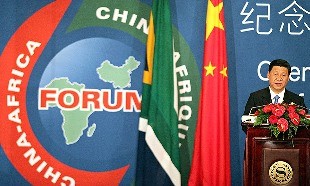Christopher Mutsvangwa, a seasoned diplomat and the cabinet minister of Zimbabwe, said that a closer China-U.S. relations could be advantageous to Africa, the Xinhua News Agency reported.
Mutsvangwa, a former ambassador to China who was promoted last year from deputy foreign minister to minister of welfare for war veterans and war collaborators, said that it is a great opportunity for the leader of the world's two major economies to meet and exchange ideas.
"China has made a lot of progress as a developing country in recent years, while the U.S. has a lot of technology, a lot of clout. The two of them coming together, it is very positive," the official said.
According to the report, President Xi Jinping told U.S. President Barack Obama in their Washington meeting that China is willing to work together with the United States and adhere to non-conflict, non-confrontation, mutual respect and win-win cooperation. China also expressed desire to expand cooperation at the bilateral, regional and global levels, among others.
Mutsvangwa expressed hope that the entente or friendly alliance between the world's two major powers would later transform into more cooperation that would benefit Africa, the report said.
"It only means that we can have a better global atmosphere," Mutsvangwa said. "Africa needs technology, capital, businesses both from China and the U.S."
The United States and Europe have imposed economic sanctions on Zimbabwe, cutting development aids and halting investments from Western companies. Although the European Union lifted the sanctions late last year, Washington is still undecided on removing Zimbabwe from its sanction list, citing concerns about human rights and democracy.
Zimbabwe then turned to emerging economies, such as China, for cooperation. In the early 2000s, Zimbabwe's veteran president, Robert Mugabe, implemented a "Look East" policy when the Western sanctions began to take effect.
Mutsvangwa has credited China for showing interest in Africa, particularly the Forum on China-Africa Cooperation (FOCAC), which was created in 2000.



























